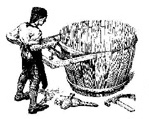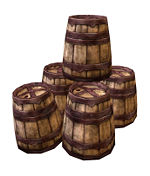 “With the coming of the Industrial Revolution, craftsmanship dissolved miserably into creativity.” In his shop beside the flour mill, the cooper spoke flatly and firmly, with no correction possible.
“With the coming of the Industrial Revolution, craftsmanship dissolved miserably into creativity.” In his shop beside the flour mill, the cooper spoke flatly and firmly, with no correction possible.
It was Colonial Williamsburg, and my daughter Emily and I were breaking our cross-country drive with a hot summer’s day walk into 18th-century Virginia.
As the day reddened into sunset, the cooper reshelved tools and stowed his bands and staves.
 “The barrel,” he informed me through thin lips, “was and is a perfected invention. Nothing to be done to make it better than it is. Unchanged for a thousand years. This…” he spoke louder as tapped the oaken lid on a chest-high, unfinished barrel, “is my best work. And it, my friend, is nothing better than the barrels I made yesterday or a fortnight ago. And that’s because I signed on as an apprentice and worked 80 hours a week for ten years to learn my trade. I learned how to not think, to be second-nature with my craft, to do the same operation over and over. In the same way. With the same tools. Making the same barrel.”
“The barrel,” he informed me through thin lips, “was and is a perfected invention. Nothing to be done to make it better than it is. Unchanged for a thousand years. This…” he spoke louder as tapped the oaken lid on a chest-high, unfinished barrel, “is my best work. And it, my friend, is nothing better than the barrels I made yesterday or a fortnight ago. And that’s because I signed on as an apprentice and worked 80 hours a week for ten years to learn my trade. I learned how to not think, to be second-nature with my craft, to do the same operation over and over. In the same way. With the same tools. Making the same barrel.”
 He sucked on a tooth and leaned closer, seemingly offering a confidence. “Now if my shop were near a winery, I’d be making hogshead barrels, 63 gallons each. If I were near a ale brewery, they’d all be 36 gallons. A armorer, the gunpowder kegs would hold 25 pounds. But I’ve set my life beside this mill. I’ve been here 24 years, lived through three wives and seven children, four of them grown and wed, the others dead and buried. Beside this mill I set my life. This barrel, oak and iron to hold 200 pounds of flour, is what I learned to make.”
He sucked on a tooth and leaned closer, seemingly offering a confidence. “Now if my shop were near a winery, I’d be making hogshead barrels, 63 gallons each. If I were near a ale brewery, they’d all be 36 gallons. A armorer, the gunpowder kegs would hold 25 pounds. But I’ve set my life beside this mill. I’ve been here 24 years, lived through three wives and seven children, four of them grown and wed, the others dead and buried. Beside this mill I set my life. This barrel, oak and iron to hold 200 pounds of flour, is what I learned to make.”
He tapped the barrel again. “This one, I say again, is nothing better than the ones I made yesterday or a fortnight ago. But nothing worse, neither. And that’s the knot I’ve untied to know my work. I do what I must do, and I do it well. Those who work on many things cannot truly know their craft, cannot be expert in anything…and those who work on one small part of a whole cannot know the entirety of what they do. They can be replaced. I cannot be.”
Standing his ground in a time before machined parts and assembly lines, the cooper stepped inside his shop and pulled the large wooden doors closed, leaving us outside in the late sun of our own century.






One Comment on “Craft vs. Creativity”
I remember that soliloquy as if it were more recent than the decade that has passed. I wore a straw hat and the day was hot and we had just come from a tour of the printshop… The cooper was ornery, I recall.
Comments are closed.